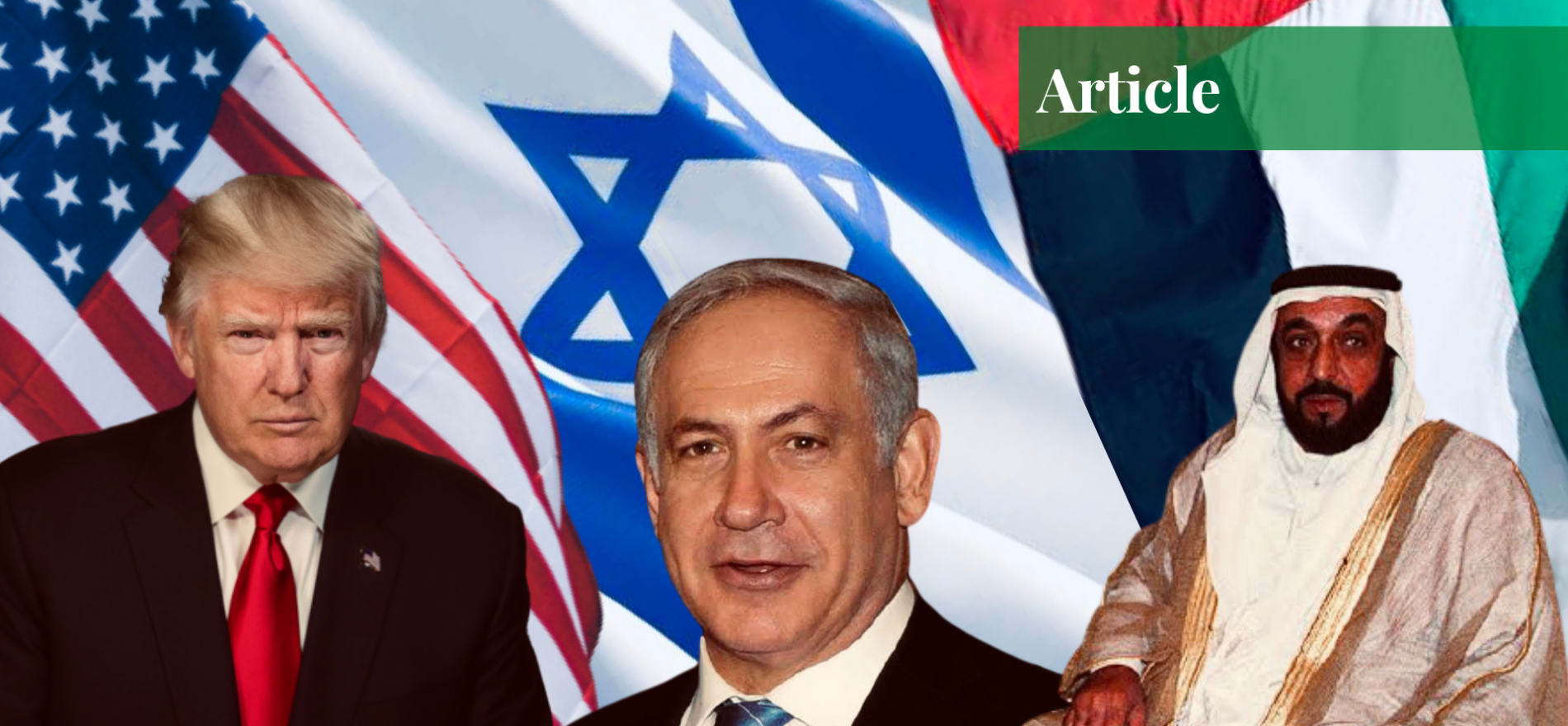Muzamil is a freelance writer with an expertise in global politics and international relations. He currently also works as a writer/contributor for Paradigm Shift. Apart from that, he loves to read and is socially active in philanthropic activities.
The Historic Peace Deals in 2020
The two-state solution remained elusive in the wake of the normalization of ties and the peace deals between Gulf countries and their Zionist rival, Israel. Termed as a “breakthrough” in the cold Arab-Israel relations since 1995, the UAE and Bahrain diplomatic thaw with Israel has met with mixed feelings throughout the world. On August 13, the UAE accepted to establish ties with Israel. This deal manifested on the notion that it would bring stability and peace in the Middle East region that has been riddled with turbulent waves for decades.
Another Gulf country, Bahrain, followed suit and made a historic breakthrough in normalizing relations with Israel on September 13, 2020, becoming the fourth Arab country to develop its formal relations with Israel after Egypt, Jordan, and the UAE. Egypt normalized its relations with Israel after the historic visit of the then Egyptian President, Anwar Sadat, to Jerusalem in November 1977. This was later known as the Camp David Accords of 1978, paving the way for diplomatic ties with Israel in 1979. However, the diplomatic breakthrough with Jordan came in 1995, a couple of years after the Oslo Agreement.

The Diplomatic Wins
The two deals, with an interval of a month, became decisive diplomatic victories for Trump amid his failures to resolve conflicts at home and abroad. The UAE stands elated on becoming the first Arab country to break the ice since the Arab Peace Initiative of 2002, a peace plan stimulated under Saudi Arabia at an Arab summit in Beirut, which signaled a desire to put an end to the Palestinian dispute on the conditions that Israel revert back to its pre-1967 territorial lines and that the Palestinian state be set up in the West Bank and Gaza with Al-Quds (Jerusalem) as its capital. In return, the Arab world would recognize and begin diplomatic relations with Israel.
According to the UAE, the deal with Israel halted the annexation of the occupied West Bank by Israeli forces, and hence, its orientation has turned out to be fruitful for peace. Refuting this narrative, the Israeli Prime Minister, Benjamin Netanyahu, reiterated that the annexation was still “on the table” and that it had only been delayed at the request of President Donald Trump. The annexation was planned by a right-wing hardliner, Netanyahu, to provide a distraction from the domestic upheavals.
Being unable to counteract the COVID-19 pandemic within his country and the fear of conviction under three criminal charges of corruption, fraud, and bribery, this diplomatic deal with the UAE became a distraction for Netanyahu’s opposing actors. Turkey, Jordan, Iran, Qatar, Algeria, and Kuwait reiterated that they would not concede to peace deals with Israel until a peaceful settlement upon the notion of a two-state solution is achieved. There was also a discussion going on in Pakistan, around whether Pakistan would recognize Israel amidst these circumstances – the majority answered with a resounding ‘no’, ending the debate completely.
The Dispirited Palestinians
Trump’s 181-page Middle East Plan, which was publicized in January 2020, has been widely criticized by the Palestinian President, Mahmoud Abbas, from West Bank’s Fatah-faction, as a “conspiracy” that “will not pass”. Similarly in the Gaza Strip, Hamas Movement official, Sami Abu Zuhr described it as “worthless” and made it abundantly clear that this was not the solution to the Israel Palestine conflict. According to the said plan, 30% of the occupied West Bank would be allotted to Israel, and as compensation for the 30%, the Palestinian people would be given land near the Gaza strip that is mostly a desert area.
Palestinian leaders have called this deal a “stab in the back” by their friends in the region that stood by them in their intifada, a self-determination movement for independent Palestine. Hanan Ashrawi, a Palestinian official, accused the UAE of abandoning the Palestinians. An official Palestinian ambassador to the UAE has also been recalled. The Anti-occupation movement of American Jews, IfNotNow’s political director, Emily Mayer, described Palestinians as “political pawns” in the Middle East deal while verifying the connivance of Trump and Netanyahu in obviating their domestic political failures.
The head of the Islamic brigade, Saudi Arabia, has not explicitly approved of the deal commissioned between Israel and the UAE, but it has allowed the first flight between UAE and Israel to pass through its airspace on Aug 31, 2020. Seemingly indulged in back-door relations with Israel, de facto ruler of Saudi Arabia and next to the throne, Mohammad bin Salman, commonly known as MBS, has been taking Saudi Orthodoxy on board in bolstering the relations with Israel. He is inspired by the economic and technological might of Israel, apart from the fact that Israel is also a very dear “cousin” of the USA.
International Politics
Despite facing incredible losses in the Yemen war against the Houthis, a Shia rebel group, the Kingdom of Saudi Arabia has to take calculated risks in forging ties with Israel. Being the torchbearer of the Islamic World, it is not easy for the Kingdom to establish its formal relations with the state that has pulled off human rights violations brazenly in the region, even defying the UN resolutions of peaceful settlements in the Palestinian region.
Jared Kushner, a senior adviser to Trump, invested 3 years in devising strategies to align Arab states with Israel (primarily by establishing diplomatic relations) in order to counteract their mutual enemy, Iran. To counter Iran as the major nuclear threat in the region, the GCC Countries have been in terrible need of western assistance in terms of economic, military, intelligence, technological, and diplomatic benefits.
Hezbollah, a Shia faction based in Lebanon and backed by Iran, has been a grave threat to Saudi Arabia and the UAE. Similarly, Iran’s funding to various Islamist factions, which perpetuate violence in Israel against its illegal occupation in the West Bank, has caused this deal to come into effect. Although, for UAE, Iran’s threat is relatively less severe than that of Turkey as various Iranian companies work in the UAE.
However, Turkey, being the major contender of Political Islam and a strong supporter of Arab world bête noire, Qatar, has been a major political threat to Emiratis because of Qatar’s backing of the Muslim Brotherhood, a Sunni Islamist organisation. Home to the U.S.A’s strategic Al Udeid Airbase, Qatar severed diplomatic ties with the UAE and the other Gulf States in June 2017 for its sponsoring of terrorism.
On the other hand, the Bahrain government praised the UAE deal and had shown interest in establishing official bilateral relations with Israel on multiple fronts, primarily to counter its neighbor, Iran, and to gain benefits for its domestic economic strengthening. The UAE and other Gulf countries have been in pursuit of acquiring American-made F-35 stealth fighter jets and other drones. This arms sale has been consistently opposed by Israel for multiple reasons, primarily to keep its regional military superiority intact.
However, Trump showed an inclination to forge a relationship with Gulf states on the military sale of F-35 jets, provided that the UAE established formal relations with Israel. Denying this notion, the Israeli Premier opposed the arms sale despite the historic UAE deal. The deal has little dissent within UAE as most of the Emiratis still remember Palestinians backing the 1990 war waged by Iraq in Kuwait.
Prospective Candidates
On September 15, 2020, both Bahrain and the UAE concluded various agreements with Israel on investment, tourism, direct flights, security, telecommunication, technology, energy, healthcare, culture, environment, the establishment of reciprocal embassies, and multiple other areas of mutual benefits. Recently, Trump has shown veritable confidence that Arab and African countries will follow suit and establish formal diplomatic relations with Israel. Potential candidates for this maxim are:
- Mauritania: It seems likely for Mauritania to formalize ties with Israel, since it previously had favorable formal ties with Israel for more than a decade, from 1999 to 2009, before war broke out over Gaza.
- Morocco: It was once a hub of Jewish life which makes it one of the potential actors to follow its regional ally, the UAE, to normalize its relations with Israel. Also, hundreds of thousands of Jews hailed from this Northern African state. In a recent stage protest outside parliament, however, Moroccans denounced these Arab deals.
- Oman: As Oman congratulated both the UAE and Bahrain over their peaceful overtures with Israel, it is presumed to be in line with the same scheme. It has been an interlocutor between Israel and UAE in the past. Also, the late Sultan Qaboos of Oman hosted Benjamin Netanyahu in 2018.
- Saudi Arabia: Its reprehensions against Iran as a regional enemy and its de facto ruler’s inclination toward the economic and technological prowess of Israel, make it one of the prospective states that may come into agreement with Israel, but it’s a long shot, given that the numerous responsibilities of the region bore on its oily shoulders.
- Sudan: Several factors may push Sudan to normalize its ties with Israel but an ‘if’ needs attention. A couple of months back, Sudanese officials met the U.S. and Emirati officials in Abu Dhabi to convince them to remove Sudan’s name from the U.S. terrorism list. It is noted that such removal would make Sudan eligible to receive international loans for its humanitarian and direct budgetary aid.
If you want to submit your articles and/or research papers, please check the Submissions page.
The views and opinions expressed in this article/paper are the author’s own and do not necessarily reflect the editorial position of Paradigm Shift.



















